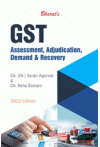- Author(s): Dr. Sanjiv Agarwal, Neha Somani
- Publisher: Bharat Law House
- Edition: 1 Ed 2022
- ISBN 13 9789390854936
- Approx. Pages 416 + Contents
- Format Paperback
- Approx. Product Size 24 x 16 cms
- Delivery Time 3-5 working days (within Kerala & South India) (Others 7-9 days)
- Shipping Charge Extra (see Shopping Cart)
......................................................................................................................................
Description
GST is one of the most sweeping indirect tax reforms in any federal polity in the world, in which complexities such as multiplicity of taxes and cesses, multiplicity of rates, multiple compliances, and cascading of taxation have been removed. This game-changing reform is expected to result in significant ease of doing business as well as reduction in the overall tax burden on the consumers and the common people. GST is a shining example of national integration and of fiscal federalism at its best. It is a testimony to the working of India's federal democracy Though GST in India is just four years old, there is a lot of scope for different interpretation and litigation between the taxpayers and revenue authorities. The assessment, adjudication and coercive steps in recovery are the starting point and root for the same. Determination of tax demand is crucial in any tax law as all provisions revolve around adjudication and determination of tax. In fact, the prime objective of any piece of tax legislation is to collect the tax revenue judiciously. Adjudication is the process of deciding an issue relating to tax matters through departmental authorities empowered to determine issues relating to classification, valuation, refund claim, tax or duty payable etc. The Department raises demands by way of Show Cause Notices (SCN) to the assessees when irregularities are observed or suspected.
......................................................................................................................................
Table of Contents
Chapter 1 GST in India — An Overview
Chapter 2 Assessment, Adjudication Demand and Recovery: Legal Framework
Chapter 3 Legal Terminology and Principles of Interpretation
Chapter 4 Assessment under GST
Chapter 5 Adjudication of Demand
Chapter 6 Demand and Recovery
Chapter 7 Liability to Pay Tax in Certain Cases
Chapter 8 Miscellaneous Provisions Applicable to Assessment etc.
Appendix 1 Meaning of Important Legal Maxims
Appendix 2 Abbreviations
......................................................................................................................................
Author Details
CA. Sanjiv Agarwal, M.Com, FCA, FCS, ACIS (UK)
CA. Neha Somani, B.Com, FCA

